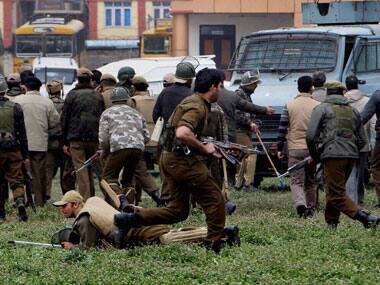A surge in militant attacks in Jammu and Kashmir will make it tough for the PDP-BJP coalition government to begin the process for revocation of the Armed Forces Specials Powers Act (AFSPA), which has been agreed upon by the two parties in their ‘Agenda of the Alliance’. Militants struck the winter capital of Jammu twice in 24 hours last week, killing eight people including four militants and injuring more than ten. The two attacks will be the first test of the Mufti Sayeed-led coalition government which assumed office on 1 March. [caption id=“attachment_2169723” align=“alignleft” width=“380”]  representational image: PTI[/caption] After nearly two months of backchannel negotiations which almost broke down at one point of time, the two parties chalked out their ‘Agenda of the Alliance’ which promised to begin the process of de-notifying areas declared as ‘disturbed’, that would eventually pave the way for the revocation of AFSPA. A senior official in the state’s home department said the process would have been started from Jammu city in Jammu and Budgam in Kashmir that have largely enjoyed a semblance of peace in the last decades. “The attacks in Jammu will certainly shadow the process (of revoking AFPA) but it doesn’t mean that the government is giving up on its promises,” the official said. Despite the attacks, Chief Minister Mufti Mohammad Sayeed said in the state assembly on Sunday that the coalition government would examine the need for de-notifying ‘disturbed areas’ for a phased withdrawal of AFSPA. “The state government keeping in view the improving security scenario will examine the need for de-notifying ‘disturbed areas’, which have been free from militancy-related incidents for quite some time. It will enable a phased withdrawal of AFSPA from such areas,” Mufti told the assembly. There is a difference of opinion within the coalition government over the removal of the act. The BJP has been publicly stating that the process of removing AFSPA should be essentially determined by the security situation in the state. “Can you look at the security issue through the prism of politics," Chaudhary Lal Singh, senior BJP leader and minister for health, said. “We will have to ensure the security of our people first and create an atmosphere to stop these kinds of attacks, instead of playing politics.” Union minister of state in the Prime Minister’s Office and senior BJP leader from Jammu, Dr Jitender Singh, said on Saturday that any decisions on AFSPA could not be taken on political consideration. “I think, this is also an occasion for us to do some re-thinking and rise above political lines. Any decision regarding sensitive issues, like AFSPA, to maintain it or withdraw it, to continue it or discontinue it, has to be essentially based on the wisdom and inputs of the security agencies, instead of getting tempted by political considerations,” he said. Even the opposition Congress party’s Legislative Party leader, Nawang Rigzin Jora, hit out at Mufti for advocating the revocation of the AFSPA. “As the home minister of India, Mufti imposed AFSPA in Kashmir and he is now talking of its withdrawal. Does he want our officers and jawans of security forces to become cannon fodder just so that he can please his sympathizers in Pakistan and the separatists in the state? Politics cannot be allowed to take precedence over national security,” Jora said. However, the PDP is asserting that the time has come for the act to go. “We have made it clear to our coalition partner that the situation has improved in Kashmir and the process of revocation must start from certain areas which have been violence-free over the last decade,” PDP’s youth president, Waheed-ur-Rehman Parra, told Firstpost. Security experts say such attacks by militants could happen anywhere in the world and they should not be used as an excuse to stop the process of the revocation of the controversial law. Suba Chandran, Director of Peace and Conflict Studies Institute, New Delhi, told Firstpost over the phone, that more than the impact on the dialogue process between India and Pakistan, Prime Minister Narendra Modi would be under pressure from people to stop attacks like these, which had been common place in the last UPA government. “But domestically,” Chandran said, “the already slow process of revocation of the AFSPA from places like Jammu and Srinagar will be delayed keeping in view attacks like these,” he said. On Friday morning, at around 6:15 am, when the unidentified militants hijacked a jeep and drove to a nearby police station in Rajbagh area of Kathua, the administration quickly called in the Army for help. “These attacks are a failure of security agencies but the same government which wants the Army to go from Jammu and Kashmir was the first to seek their help within minutes of the attack,“Bhim Singh, President of the Panthers Party, who has been opposing revocation of the act, told Firstpost over the phone from Jammu.
A surge in militant attacks in Jammu and Kashmir will make it tough for the PDP-BJP coalition government to begin the process for revocation of AFSPA
Advertisement
End of Article


)
)
)
)
)
)
)
)
)



